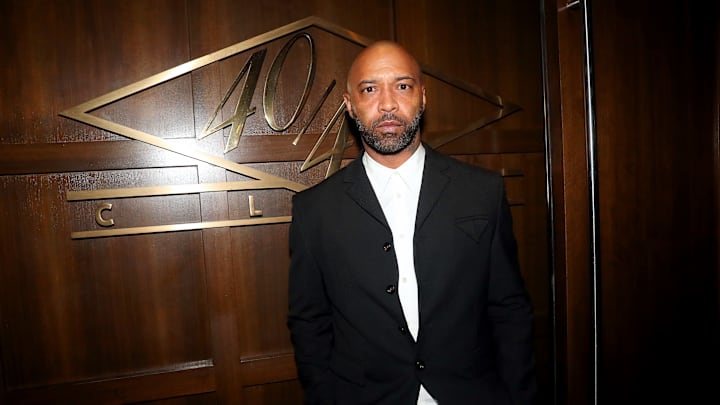In a surprising twist, Joe Budden, the seasoned hip-hop commentator and former Love & Hip Hop star, has publicly expressed his delight at Future’s recent actions. The Atlanta-based rapper, known for his chart-topping hits and distinctive trap sound, has apparently disrupted the status quo in the rap industry.
The monetized relationship: A stifling trend
For years, hip-hop has been dominated by collaborations, strategic alliances, and carefully orchestrated partnerships. These alliances often serve as lucrative revenue streams for artists, record labels, and streaming platforms. But at what cost? Critics argue that this cozy ecosystem stifles creativity, suppresses competition, and dilutes the raw essence of hip-hop.
Enter Future, the enigmatic artist who has consistently pushed boundaries and defied conventions. His recent move to break away from a high-profile, monetized relationship has sent shockwaves through the industry. But why is Joe Budden celebrating this rupture?
Future’s bold move
Future, whose real name is Nayvadius DeMun Wilburn, has always been an outlier. His unapologetic lyrics, hypnotic beats, and genre-blurring approach have earned him a dedicated fan base. But it’s his decision to step out of a carefully crafted partnership that has caught everyone’s attention.
Future and Metro Boomin's album featuring Kendrick Lamar

The album featuring Kendrick Lamar, Future, and Metro Boomin has sparked discussions about competition and potential rifts in the hip-hop community. Kendrick Lamar's verse on the track "Like That" has been particularly noteworthy, as it contains apparent disses aimed at fellow rappers Drake and J. Cole. This has led to speculation about the impact of the album on the dynamics of the hip-hop industry.

Kendrick Lamar's verse on "Like That" is described as hard-hitting, with him pronouncing himself as the best in the game and taking shots at Drake and J. Cole . The verse has been characterized as a "blistering mic drop" and a "flamethrower" that ignites debates and forces a reexamination of the hierarchy of rap royalty . The track has been seen as a potential catalyst for reigniting feuds and exposing the hollowness of friendships among MCs in the industry.
The release of this album has brought attention to the competitive nature of the hip-hop scene and has sparked discussions about the authenticity of relationships among artists. Kendrick Lamar's verse, in particular, has been seen as a bold declaration of supremacy and has led to speculation about its potential impact on the dynamics of the rap game.
The specifics of the relationship remain undisclosed, but rumors suggest it involved joint ventures, exclusive deals, and brand endorsements. Future’s departure signals a return to the days when hip-hop thrived on healthy competition, artistic clashes, and lyrical sparring. It’s a move that harks back to the golden era of rap battles and hungry emcees vying for the throne.
Joe Budden’s take
Joe Budden, no stranger to industry politics, sees Future’s move as a breath of fresh air. In an exclusive interview, he stated, “We’ve been drowning in collaborations and sponsorships. It’s time for artists to reclaim their individuality and hunger. Future’s disruption is a wake-up call—a reminder that hip-hop was built on fierce rivalries and unfiltered expression.”
Budden believes that Future’s departure will inspire other artists to break free from the shackles of convenience. He envisions a resurgence of lyrical warfare, where emcees battle not just for streams and likes but for respect and legacy. “We need more sparks, more fire,” Budden emphasized.
Joe Budden conveys his frustration with the prevalence of insincere relationships and behaviors in the music industry, particularly criticizing artists who engage in phony friendships, superficial alliances, and the pressure to conform to industry expectations for personal gain and image enhancement. Budden expresses a desire for genuine interactions and a departure from the prevalent inauthenticity in the industry.
"I come in here all the time and tell y'all I hate them phony cliques. Did y'all fucking do I hate them? I hate when y'all walk center stage, hold each other's hands up, and start sucking d*ck, showing in every city. Yo, us by me, yo unit, best. Yo, my brother. Yeah, you're just not your f**king brother. You're my brother, man. It's not your brother. "
"I'm so secret, f**king callate all stars and coal with this sh*t color. Want to do that sh*t. You got to do it because it's f**king breaking the bricks. He's taking his stupid muscular astronaut outfit. You got to do it. But nobody wants to do that sh*t. I love that future is the one to break up all of these fucking monitored, monetized friendships. "
"Yeah, n*gg*, all of the Drake balls God that Nick has been too scared to press Drake about because now that's few deaths are Ross, that's Khaled, that's Young Thug, that's the whole crop England with future, hey all Travis, you phony **s n***a, when I mean, Travis, that f**king rollerbladers look would play this one played at this as we did, yes. Was the song. "
The impact
Future’s bold move has already sparked debates across social media platforms. Fans are divided—some applauding his courage, while others fear the repercussions. Will this shake-up lead to a renaissance of hip-hop authenticity? Only time will tell.
In the meantime, Joe Budden’s optimism remains unwavering. “Competition breeds greatness,” he declared. “And hip-hop deserves nothing less.”
